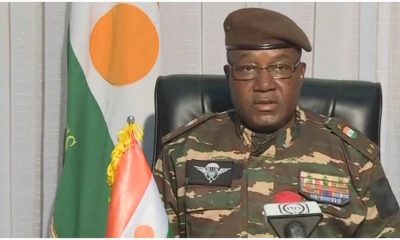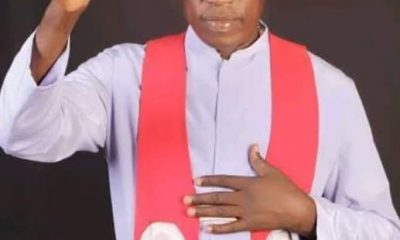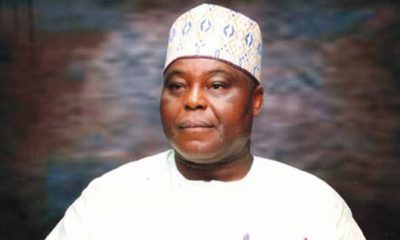Uncategorized
UBEC boss Aisha Garba vows to achieve Tinubu’s Agenda on basic education for Nigerian children

The Executive Secretary of the Universal Basic Education Commission, (UBEC) Aisha Garba, has called on ministries of education across the 36 states and the Federal Capital Territory (FCT), the private sector, partners and other stakeholders, to synergise and commit themselves towards achieving President Bola Tinubu’s Renewed Hope Agenda of access to basic, quality education for all Nigerian children, no matter their location or background.
Aisha Garba threw the challenge Monday in Abuja while addressing participants at a workshop organized by the Commission aimed at strengthening and advancing basic education in Nigeria.
She described the workshop as a testament to the seriousness of the Commission to achieving its mandate, adding that to achieve the goal, there was the need to priotise, strengthen and foster effective collaboration at national and state levels within and beyond the education sector.
She said, “This workshop provides us with a unique opportunity to collectively evaluate our progress, identify challenges and chart a new pathway towards achieving our shared goal of an efficient and effective basic education system in Nigeria.
“As I stand here before you, my goal is to build on the President’s Renewed Hope Agenda and carry forward, his vision for providing and supporting quality education across Nigeria.
“Let me start by appreciating the Honourable Minister of Education, Dr. Maruf Tunji Alausa and the Minister of State, Prof. Sawaiba Said Ahmed, for their immense support since I assumed office.
“I also want to extend my gratitude to the Directors, Unit coordinators, and the entire staff at UBEC for warm welcome and hard work. I applaud all the Executive chairpersons of the State Universal Basic Education Board who have come from across the country for this all-important workshop.”
Aisha Garba, appreciated achievements recorded in the past in the task of providing Nigerian children access to education but went on to highlight some shortcomings and challenges that need to be addressed, going forward.
“While we acknowledge the progress made in advancing basic education in Nigeria over the past decades, it is imperative that we address the persistent challenges such as finances, infrastructure, quality education and relevant learning materials, shortage of teachers and conducive environment for teaching and learning.
“Furthermore, there is poor coordination and weak partnership between critical stakeholders in the sector with inconsistent collaboration among UBEC, BUBEBs and state ministries of education, resulting in inefficiencies, poor monitoring, and reduced impact of educational interventions. Tackling these challenges require bold, collective action, underscoring the need for this workshop.
“Education is the bedrock of national development, and achieving universal basic education requires a collaborative effort. Government agencies, private sector stakeholder, development partners, and civil society organisations must work hand in hand to address challenges.”
She stated that basic education in Nigeria cannot advance significantly without a robust and coordinated partnership and collaboration between UBEC, SUBEBs, and the state ministries of education, adding therefore that the workshop is beyond quarterly meetings.
“It aims to reinforce this partnership, recognizing that meaningful collaboration between these critical sectors, is important to achieving improved effectiveness in the delivery of basic education services to Nigerian children. To this end, I urge us all to commit to greater synergy in policy implementation, accountability in resource mobilization and adherence to best practices in governance and financial management. This will ensure that our interventions yield the desired impact and unlock the full potential of our collective efforts.
“As we deliberate in this workshop, let us be solution-oriented, action-driven positive and committed to building a stronger, more efficient system for universal basic education in our country.”
She reiterated UBEC’s commitment to its mission to improve access, equity, and quality in basic education across the country and said that the workshop was designed to provide a platform for robust discussions on how to leverage partnerships to enhance funding, policy implementation and innovative teaching methodologies.
“Through these engagements, we aim to develop actionable strategies that will drive sustainable improvements in basic education to build lasting partnerships that will uplift the educational landscape for generations to come.
“I urge you all to remain committed to the vision for basic education in Nigeria and participate actively in this workshop. Your expertise and dedication are invaluable as we work together to shape the future of education in Nigeria.
“I will work with anyone that is willing to work and achieve result,” the UBEC boss stated.
Apart from the representative of the Hon. Minister, others dignitaries in attendance at the workshop include SUBEB chairpersons, Directors, Deputy Executive Secretaries, management and staff of the Commission.
Uncategorized
Police, NSCDC, Prisons, others receive operational vehicles from Kogi Security Trust Fund

As a measure to further strengthen the capacity of relevant authorities to fight terrorism, banditry, kidnapping and other related criminal activities, the Kogi State Security Trust Fund has handed over some operational vehicles to the Nigeria Police, Nigerian Security and Civil Defense Corps, Immigration, Customs Service, Vigilant organisation and others.
The vehicles, 16 in number, were presented to the security agencies on Thursday in Lokoja, on behalf of Governor Usman Ododo, by Mrs. Funmilayo Bello, Administrative Officer in the Office of the Director General, Government House administration.
Represented by Umar Shaibu, Director General, Government House, Mrs Funmilayo oemphasized Governor Ododo,s concern for public safety and the welfare of the people and noted that the initiative was part of the Governor’s broader strategy to eradicate insecurity and promote a peaceful environment conducive to growth and development.
Chairman of the Kogi State Security Trust Fund, Air Vice Marshal Faruk Omeiza (Rtd), praised Governor Ododo for improving the state’s security architecture and for supporting security agencies in the state.
He described the refurbished vehicles as a testament to the state government’s determination to equip security personnel with tools necessary for rapid response and operational effectiveness.
Receiving the vehicles on behalf of the security agencies, Deputy Commissioner of Police, DCP Daba Mallam, who represented the State Commissioner of Police, Miller Dantawaye, expressed appreciation to the state government for the gesture.
He assured that the vehicles would be put to effective use and urged officers to ensure good maintenance of the vehicles to serve them better.
Similarly, Deputy Commandant of the Nigeria Security and Civil Defence Corps (NSCDC), Idonie Felix, thanked Governor Ododo for the gesture, affirming that it would enhance their operational output.
He pledged the continued dedication of NSCDC personnel to protecting the lives and property in the state.
Representatives of other security formations, including the Nigeria Immigration Service, Kogi State Vigilante Service, and the Nigerian Correctional Service, also commended the Governor for prioritizing security of lives and property.
They pledged their agencies’ commitment to partnering with the government for a safer Kogi State.
Yunusa Jimoh, a representative of Access Bank, expressed the bank’s readiness to continue supporting the security sector through strategic partnerships and corporate social responsibility initiatives.
Highlights of the event was the formal presentation and handover of the refurbished vehicles to heads of security agencies in the state, marking another milestone in the administration’s proactive approach to enhancing security architecture in the state.
Uncategorized
2027: APGA chieftain drums support for Peter Obi

A chieftain and founding member of the All Progressives Grand Alliance (APGA), Onwuka Ukwa, has urged Nigerians to rally behind Peter Obi in the upcoming 2027 presidential election, describing it as a critical moment for the nation’s future.
This is coming a week after Anambra State Governor, Chukwuma Soludo endorsed President Bola Tinubu of All Progressives Congress, APC, for a second term.
Ukwa emphasised that the 2027 presidential election would be one of Nigeria’s most consequential political decisions.
He stressed that the election would present a rare opportunity for citizens to reset the course of the nation, ensuring its survival as a united entity.
Ukwa said, “The next presidential election is crucial. It offers Nigerians an opportunity to make a decision that will determine the future of this nation as a united Nigeria.
“It will be a chance to put our nation back on track and regain what has been lost over the years.”
Ukwa further highlighted Peter Obi’s governance track record, particularly his tenure as Governor of Anambra State, where he was known for an unprecedented level of accountability and transparency.
He pointed out that Obi’s leadership style had set him apart from other presidential hopefuls, many of whom, according to him, had already led the country to a political deadlock.
“Peter Obi exhibited a high level of accountability that has never been seen in the history of Nigeria’s politics. He stands out among the candidates for the 2027 elections, as the current leaders have already exhausted the country’s political potential,” Ukwa added.
Ukwa also criticized the current state of Nigeria, emphasizing the country’s failure to thrive due to a lack of accountability, rule of law, and good governance.
He warned that Nigeria’s survival in the modern world, especially in the age of digital innovation and technology, requires a leader with the right skills and expertise to navigate the intricacies of modern governance.
He said, “Do not expect leaders who have already failed to give you what they do not possess. The once-promising potential of Africa’s giant is now a shadow of itself. Basic democratic institutions are under attack, and the sovereignty of the nation is being breached daily.”
Drawing attention to Obi’s alignment with the United Nations Millennium Goals to Governance, Ukwa affirmed that Obi is well-suited to lead the country in 2027, given his past record and approach to governance.
News
Major takeaways from Gov Ododo’s inspection tour of projects in Kogi Central

By ismaila Isah
Few days ago, Governor Alhaji Ahmed Usman Ododo concluded a 5-day inspection tour of ongoing road projects and community engagement across the five local government areas of Kogi Central Senatorial District comprising Adavi, Ajaokuta, Okehi, Okene, and Ogori-Magogo local government area as part of his administration’s ongoing commitment to enhance equitable development across the state.
The tour, which formed part of the “Take Governance Closer to the People” initiative, saw the governor physically inspect key projects and engage directly with residents, community leaders, and contractors.
Importance of Project Inspection
Project inspections, monitoring and evaluation are integral parts of governance. Inspections are crucial for ensuring project success by verifying work quality, identifying potential milestones and grey areas, where there may be, early, and addressing them before they constitute set backs for the project.
Inspections also help prevent costly mistakes, delays, and safety hazards, ultimately contributing to project efficiency and completion within budget and on schedule.
Among the major projects inspected was the 8.6 kilometer Obangede–Okaito road and the 3.2 kilometer Obangede-Oboroke road linking Eika and Ihima districts in Okehi local government area and several ongoing road projects in Ihima.
The governor also visited the Obangede–Oziokutu road, as well as other access roads linking several rural communities in Adavi and Okehi local government areas.
One of the significant attractions of the road projects in Okehi and Adavi local government areas includes the over 60-years old Ategoza bridge which served as the link between the old Kabba and Ebira division in the old Kabba province which had previously defied major interventions in the past. Another key feature of the new roads is the Oziokutu bridge on the spur of the Obangede-Ogaminana road which is the link between the people of Adavi and Okehi who shared several historical, social and economic ties.
These projects, according to Governor Ododo, are designed to improve connectivity, open up rural economies, and ensure access to essential services by the people.
At every stop, Governor Ododo emphasized the importance of quality control and timely delivery, reiterating that the state government would ensure value for investment in infrastructure in all parts of the state.
“We will not tolerate substandard work. The people of Kogi state deserve quality infrastructure, and that is what this government will deliver,” he said during a stop in Adavi.
Taking Governance closer to the People
In addition to project inspection, the governor also engaged with communities in his itinerary calling for accountability from those in positions of authority and responsibility from the community to hold their leaders accountable at all times. He urged the people to take ownership of public infrastructure and maintain vigilance to protect public investments from vandalism.
In Ogori-Magongo, the governor participated in the annual Ovia Osese Festival, a cultural event of historical and communal significance to the people of the area. His presence was seen as a sign of respect for the community and a commitment to the preservation of cultural values.
Speaking at the event, the governor pledged to support the revival of cultural heritage in the state as a key driver of unity, peace and tourism development.
In Okene, where he had attended the commendation service in honour of the former deputy governor, late chief Patrick Adaba, Governor Ododo also met with the stakeholders in Upogoro, Bariki, Idoji and Onyiukoko wards where he listened to concerns about gaps in ongoing projects and the need to address challenges of youth unemployment and women empowerment.
In response, the governor assured the people that his administration would prioritize inclusion in infrastructure and social welfare plans of the state government.
In Ajaokuta, Governor Ododo paid a condolence visit to the member representing Ajaokuta federal constituency in the House of Representatives, Hon. Sanni Egidi Abdulraheem following the demise of his mother, and used the occasion to reaffirm commitment to completing ongoing projects in the area.
While inspecting roads and major erosion control projects in Etahi and other communities in Okene, Governor Ododo took time to interact with residents and assured them that infrastructural expansion by the state government would ease access to schools, markets, and healthcare facilities.
At a community town hall meeting with the people of Adavi local government area in Ogaminana, the governor expressed appreciation to the people for being peaceful and law-abiding as he outlined his administration’s goals, pledging inclusive governance and to sustain his people-oriented approach in project implementation.
Governor Ododo also urged well-to- do members of the community to continue to contribute to the development of the area, noting that government efforts must be complemented by citizens participation.
The governor reassured the people that similar efforts are underway across the three senatorial districts in the state to ensure that all ongoing projects are delivered to specifications in terms of quality and timely completion stressing “no part of the state is left behind.”
“What we are doing in Kogi Central is also taking place in Kogi East and Kogi West. Our project monitoring teams are also conducting inspections in other parts of the state. We will continue to monitor, evaluate, and complete projects that matter to the people,” Governor Ododo said.
Ismaila Isah is the Special Adviser on Media to Governor Usman Ododo.
-

 News2 years ago
News2 years agoBreaking: Tinubu’s authentic ministerial nominees
-

 News2 years ago
News2 years ago“Anytime we want to kill terrorists, President would ask us to take permission from France but they were killing our soldiers-” Niger Republic coup leader
-

 News2 years ago
News2 years ago“I’m leaving the Catholic church because Bishop Onah is oppressing me,” says Okunerere
-

 News2 months ago
News2 months agoSenate to speed up conclusion of Nigeria Forest Security Service Bill
-

 News2 years ago
News2 years agoDokpesi and the Gazebo Mystique
-

 News2 years ago
News2 years agoRadio Nigeria’s veteran broadcaster Kelvin Ugwu dies three months after retirement from service
-

 News1 year ago
News1 year agoPersons against Allagoa’s reforms behind protests at NSITF
-

 News2 years ago
News2 years agoTsunami: Tinubu orders dissolution of managements, boards of MDAs, to sack all Buhari’s political appointees

